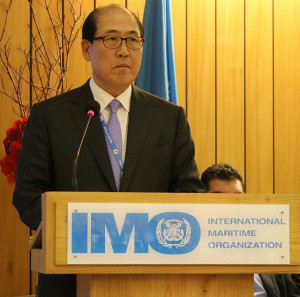
By Jite Eriabie
The whole world would be watching the International Maritime Organization (IMO) in 2018, looking for something of real substance when it comes to reducing greenhouse gas emissions from international shipping, IMO’s Secretary-General Kitack Lim pointed out.
“Next year really will be a time when the world will expect IMO Member States to deliver a clear vision as the first stage of the approved roadmap. I urge you, be bold; set ambitious goals that really will make a difference. You have a real opportunity here to do something of lasting significance. Make the most of it,” Lim said while speaking at the 30th Assembly session at IMO Headquarters in London.
IMO’s Marine Environment Protection Committee (MEPC) is set to adopt an initial GHG strategy in April 2018.
More than 1,500 delegates from IMO Member States, international governmental and non-governmental organizations have registered to attend the session that meets from November 27 to December 6.
Lim outlined the key elements of the new “Strategic Plan for the Organization” for 2018 to 2023, which is expected to be adopted by the Assembly.
“The seven strategic directions point us now towards more effective rule-making and implementation processes by integrating new and advancing technology to respond to our challenges, among others, to increase ship safety, including addressing new emerging technologies such as autonomous vessels, our contribution to combat climate change, engagement in ocean governance, mitigation of cyber-crimes, and facilitation of international trade, whilst continuing to take due consideration on the human element factor,” Lim said.
The rapidly increasing pace of change in every sphere raised a fundamental issue, since technology will move far quicker than the regulatory process, he added.
“Digital disruption will arrive in the shipping world very soon; and, when it does, IMO must be ready,” Lim said. “For me, this means the regulatory framework for shipping must be based firmly around goals and functions rather than prescriptive solutions. This is the only way to ensure that measures adopted by IMO are not rendered obsolete by the time-lag between adoption and entry-into-force.”
The IMO as a whole needed to become more effective, more nimble and more adaptive, Lim pointed out, drawing attention to his determination to push forward a “Knowledge based Organization” concept, embracing data in the Secretariat’s work and in the decision-making processes.
“For IMO, we need to have more detailed and deeper analysis of statistics and data so that we can really understand underlying trends and causal factors behind shipping casualties; and we must make sure that additions and amendments to the regulatory framework are also based, wherever possible, on relevant statistics, studies and analysis. This would pave the way for better regulation, one that not only takes into account the work carried out to reduce administrative burdens, but to avoid disproportionate requirements, as well as addressing obsolete and unnecessary ones,” he noted.
IMO’s work to support the 2030 Agenda for Sustainable Development and the associated Sustainable Development Goals was also stressed.